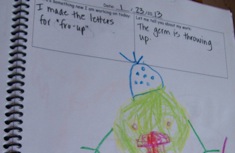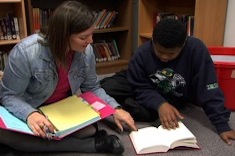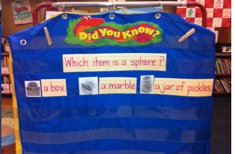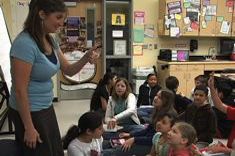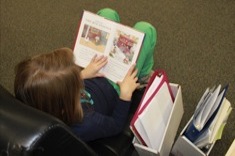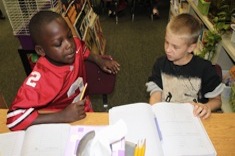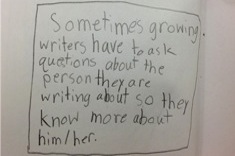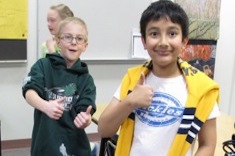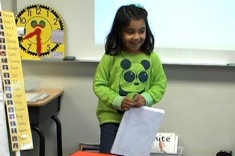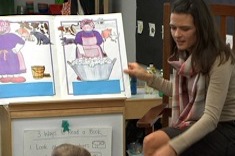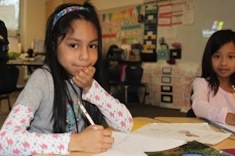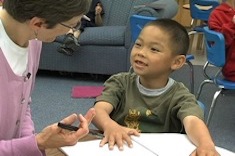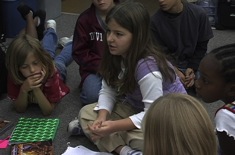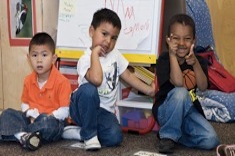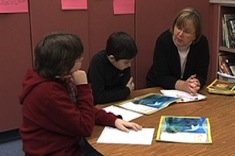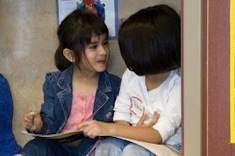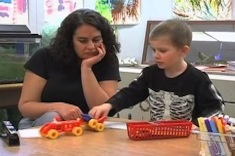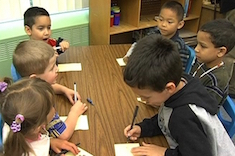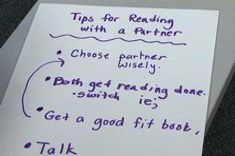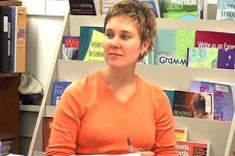Talking and Listening
Listening and speaking—it's the art at the heart of literacy workshops. But there is also a science to how these skills are taught and learned. These resources will show you how to build communication skills in your classroom and school communities.
Latest Content
In Defense of Dictation
Leslie Woodhouse finds dictation is a critical tool for understanding young writers and their sense of story.
New Teachers: The Power of Inexperience
Sometimes a lack of experience is a gift worth embracing. Michelle Kelly considers all the strengths new teachers bring to schools, from their comfort with technology to genuine enthusiasm.
Exploring Rick Riordan Books in an 8th Grade Conference
In this video from Katie Baydo-Reed’s 8th grade classroom, Katie confers a student about his favorite Rick Riordan books and his plans for future reading.
Do You Have Any Questions? Conferring with Families
We've all experienced that moment in a parent conference. You finish your spiel, which includes assessment data, charts, and an anecdote or two about the child. And when you're finished, the parent asks, "But how is my child doing?" Melissa Kolb explores the reasons why there can be a mismatch between our sense of useful information in parent conferences and a parent's expectations.
Keeping Track of Questions
Andie Cunningham observes a third-grade teacher as she systematically improves the quality and depth of student questioning over time.
Every Picture Tells a Story
Max Brand describes how he uses images to build reading and writing skills among his kindergartners.
Kindergarten Moments Count: Question of the Day
Keri Archer makes the most of the time her kindergarten students spend transitioning into her classroom with her Question of the Day.
The Truth About Building a Writing Community in Middle School
Building a sense of community is complicated in middle school classrooms. Katie Baydo-Reed considers her eighth graders, and is surprised at what endures most with these young teens.
Supporting Introverts in a First-Grade Classroom
Courtney Pawol looks at how being an introvert affects her role in learning communities, and then moves from insight to practical changes to help the introverts in her first-grade classroom.
Peer Conferring: The Release Phase
Amanda Adrian concludes her series on peer conferring, analyzing the value of students working on their own after instruction and practice.
Building Peer Conferring Skills in the Primary Grades
Ann Marie Corgill questions whether her second graders are ready for peer response. She finds that with some guidance and construction of anchor charts together, the answer is a resounding yes.
Lifting the Quality of Peer Response
Tony Keefer discovers that his fourth-grade students need focused instruction and support to strengthen their peer conferring skills. Tony shares tips and two video examples from his classroom.
Whole Class Writing Share: Teaching Response Skills in 1st Grade
Katie DiCesare’s first graders respond to their classmates’ writing, using questions they developed together over time.
A Picture Walk in Kindergarten
Mandy Robek takes her kindergartners through a picture walk using Mrs. Wishy Washy as the text.
I Have Two Pictures of Cindy. . .
Melissa Kolb writes about the importance of time and patience in meeting our goals with young learners — in this instance, a child who struggles to speak in her preschool classroom.
Hearing Carlos: Helping Young English Language Learners Develop Speaking and Listening Skills
Stella Villalba incorporates more speaking and listening activities into her primary classroom for English language learners.
Peer Conferring: The “Try It On” Phase
Amanda Adrian continues her series on how teachers can scaffold and model peer conferring. In this installment, Amanda uses the fishbowl technique with students.
Preschool: Learning in Many Languages
Melissa Kolb explains how she supports many languages in her preschool classroom through the thoughtful use of volunteers and other resources in this three-minute video.
Do They Care? Empathy Book Clubs
Do they care? That’s the question Karen Terlecky asks herself as she sets up book clubs in her fifth-grade classroom with a focus on empathy.
Without Answers
English language learners may have some of the quietest voices in schools. In this poem and narrative, Stella Villalba shares the power of finding ways to bring those voices out in your classroom.
A Perfect Storm
If you work with young children, you know these girls. Olivia is a pink princess, given to tears and fanciful tales of slights from classmates. Maggie is a tomboy who struts around in zombie t-shirts and doesn’t suffer fools gladly. The two meet like gladiators in the preschool playhouse late in the school year.
From Playing to Drawing to Writing in Preschool
Kelly Petrin guides Drew from playing to drawing and finally writing during this conference in her preschool classroom.
Engaging Boy Readers: Beginning with Teacher Behaviors
Tony Keefer considers some of those awkward early conferences with male readers in his classroom, and shares advice on how to get the year off to a comfortable start with minilesson and conferring suggestions.
Are Your Writers Talking During Writing Workshop?
Stella Villalba shares practical tips for helping young English language learners collaborate with classmates and receive feedback during writing workshop.
Partner Reading: Helping Peers Teach Peers
In this video from Linda Karamatic’s second-grade classroom, two girls meet with Linda to develop tips to share with their classmates on how to partner read successfully.
Energy, Stamina, and Training Wheels for Coaching Teachers
Gradual release, not-so-gradual release or catch and release? Heather Sisson ponders the challenges of providing the appropriate support in a coaching cycle.
Discussing Observations with New Teachers
Jennifer Allen’s new teacher group discusses what they learn from classroom observations in this video taped early in the fall.
Focused Independent Reading in Second Grade
Sean Moore demonstrates how he helps students focus their independent reading with preparation and then with discussion after reading.
The ABCs of Literacy Coaching (Part 1)
Heather Rader shares the essential elements of successful literacy coaching in this first installment of a month-long series.
Ask Me – I’m Not the Expert
Heather Sisson explores the complicated links between relationships and expertise for literacy coaches and teachers.
Browse Content By
Type
Category
- Assessment Tools
- Big Fresh Archives
- Booklists
- Choice Numeracy
- Classroom Design
- Common Core
- Community Building
- Conferring
- Content Literacy
- Digital Literacy
- English Language Learners
- Equity
- Family Relations
- Free Samples
- Guiding Groups
- Leadership
- Literacy Coaches
- Mentor Texts
- Minilessons
- New Teacher Mentors
- Podcasts
- Poetry
- Quote Collections
- Reading Strategies
- Self Care
- Struggling and Striving Learners
- Talking and Listening
- Teacher Study Groups
- Teaching Reading
- Teaching Writing
- Word Study and Vocabulary
Author
- Melissa Quimby
- Nawal Qarooni
- Gwen Blumberg
- Julie Cox
- The Lead Learners
- Hannah Tills
- Josie Stewart
- Ruth Metcalfe
- Mallory Messenger
- Becca Burk
- Jodie Bailey
- Vivian Chen
- Mary Brower
- Tiffany Abbott Fuller
- Stephanie Affinito
- Ruth Ayres
- Leigh Anne Eck
- Heather Fisher
- Shari Frost
- Julie Johnson
- Suzy Kaback
- Gigi McAllister
- Shirl McPhillips
- Melanie Meehan
- Cathy Mere
- Debbie Miller
- Tara Barnett and Kate Mills
- Tammy Mulligan
- Dana Murphy
- Bitsy Parks
- David Pittman
- Brenda Power
- Heather Rader
- Matt Renwick
- Mandy Robek
- Christy Rush-Levine
- Gretchen Schroeder
- Jen Schwanke
- Brian Sepe
- Katherine Sokolowski
- Stella Villalba
- Jennifer Vincent
Grade Level
Choice Literacy Membership
Articles
Get full access to all Choice Literacy article content
Videos
Get full access to all Choice Literacy video content
Courses
Access Choice Literacy course curriculum and training

